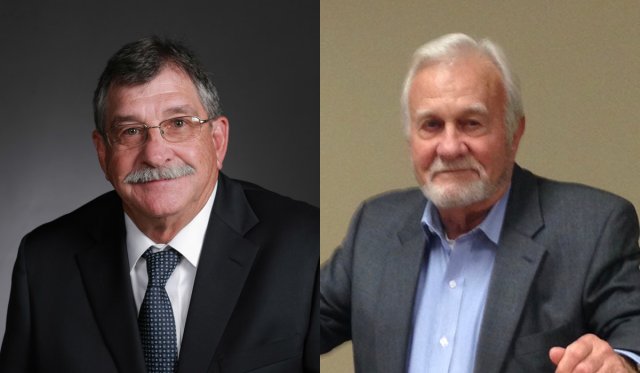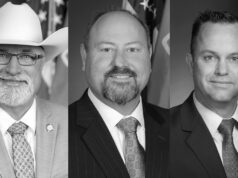

Arkansas is stealing their teachers. Arkansas is stealing their business. Arkansas is stealing their economic development. The candidates for Oklahoma House of Representatives District 3 know the special challenges of representing communities situated at the Arkansas border because they’ve both done it before.
Mike Sullivan, a Democrat who ran unopposed in June’s primary, represented the far eastern Oklahoma district from 1969 to 1972. On Nov. 3, he’ll be facing Republican Rick West, who occupied the seat from 2016 to 2018. In June, West defeated the current officeholder, Rep. Lundy Kiger (R-Poteau), winning the GOP primary by 272 votes.
Though four decades separate their past terms, both Sullivan and West say they feel as prepared as ever to fight for the district’s constituents.
Fighting for familiar territory
Sullivan was first elected to HD 3 in 1968. After being re-elected for his second term in 1970, he was appointed the House’s first assistant majority floor leader.
“I don’t like to brag, but I really liked this job, and I was really good at it,” he said, reminiscing about his past achievements. “The fellow people that I served with obviously saw that when they put me in a high position.”
HD 3 at a glance
ZIP codes represented: 74901, 74902, 74932, 74937, 74939, 74940, 74951, 74953, 74959, 74966
Counties represented: LeFlore
Cities/Townships represented: Arkoma, Cameron, Fanshawe, Fort Coffee, Heavener, Howe, Pocola, Poteau, Rock Island, Spiro, Wister
Sullivan lost the district’s Democratic primary in 1972 and went on to spend 14 years on the local board of education in Poteau. Then he served two terms as a district attorney for LeFlore and Latimer Counties in the 1990s.
During his time in that office, Oklahoma’s multi-county grand jury indicted several of his employees for mishandling drug task force funds. Two of the office’s former investigators pleaded guilty to embezzlement charges. Sullivan said the investigations did not find that he had any involvement.
Now, no longer a young man, he feels his experiences make him an ideal 2020 candidate.
“I think the younger members up there on the Democrat and Republican sides will listen to me,” he said. “Maybe I can stop some of this petty bickering that is going on all the time, and we can get something done for the state.”
If elected, Sullivan plans to reignite initiatives from his previous stint in the Oklahoma House, including efforts to resurface the roads in his area and to open new facilities for individuals struggling with drug addiction and mental health challenges.
“A lot of problems are not getting addressed with education and the roads and mental health facilities for the young people of this state,” he said. “Those are all things that I addressed when I served before.”
Sullivan’s competition, Rick West, also claims past experience in the office makes him a stronger candidate.
West was elected to the office in 2016, beating challengers Troy Dyer and Dewey Harrison and becoming the first Republican to serve HD 3 in more than 50 years.
In his 2020 campaign announcement, West expressed that his two years in the House strengthened his commitment to representing the values of those who voted for him.
“It was not easy to ‘vote my district’ each time, as it often meant going against ‘leadership’ or stepping away from solutions I knew might bring other benefits later on,” he wrote. “By that I mean that ‘going along’ in the Legislature is how members move up in influential committees and power relationships. It was, however, the right thing to do, and it let me look everyone back home, right in the eye, and tell the truth about what was happening.”
West made a campaign promise that he will not accept contributions or gifts from lobbyists or political action committees. He posted a five-minute video to his Facebook page a day before the June 30 primary in which he is seen returning a check he received for $1,500 from a PAC in Oklahoma City.
Controversial roles in two historic votes
In March, Sullivan posted a long list of his accomplishments on his campaign’s Facebook page. Among these were obtaining increased funding for roads and aiding in transitioning Poteau Community College to Carl Albert State College.
The list also includes passing a bill that “saved the Teacher Retirement System in Oklahoma” — a bill Sullivan says also caused his House career to come to a sudden end.
When newly elected Gov. David Hall proposed what was, in 1971, the first oil and gas tax increase in more than three decades, Sullivan was drafted to help author the bill for the House. The additional revenue was to be designated for education.
After heated negotiations, the package was passed, and the gross production tax rate was raised from 5 percent to 7 percent.
According to Sullivan, his involvement with this bill caused the oil and gas industry to help fund opposition to him in the next election, and he lost in the 1972 Democratic primary.
“But I don’t regret it,” he said. “It was worthwhile.”
Rick West also left office in the wake of a vote on taxes for education funding.
In West’s case, he cast a controversial vote against the historic revenue package to fund teacher pay raises in response to the 2018 teacher walkout.
“I really kind of felt like, you know, everybody Republican believed in the Republican platform and governed that way,” he said of his expectations when taking office. “It didn’t necessarily turn out that way when it came to taxes.”
West felt that raising taxes would go directly against the wishes of his constituents.
“I voted for the teacher pay raise,” he said. “I just didn’t vote for the cigarette tax and the gross production tax and the fuel tax and the gasoline tax (to fund it).”
West said he decided not to run for re-election in 2018 in order to attend to family matters. Now, running in 2020, he said he will continue to oppose taxation he feels could harm local businesses.
Life on the border
Both candidates have spent most of their lives in LeFlore County, and they say they feel the competition with neighboring Arkansas deeply.
West said ensuring that local businesses are able to maintain low prices on everyday goods is one of his top priorities. By opposing increased taxes on these products, he says he can help prevent customers from crossing the border to spend their money.
“I represent a county that’s on the border with Arkansas, and our stores have to compete — gas prices, cigarette prices,” he said. “People just did not want their taxes raised, and I promised them I wouldn’t, and they asked me not to, and I kept my word.”
Sullivan has also made lessening the effects of this interstate rivalry a central promise of his campaign.
He said that, if elected, he aims to implement another teacher pay package similar to the one his opponent voted against in 2018. This raise, Sullivan said, would help close the teacher pay gap between Oklahoma and Arkansas, which currently causes many of his county’s most experienced teachers to cross state lines in search of higher wages.




















